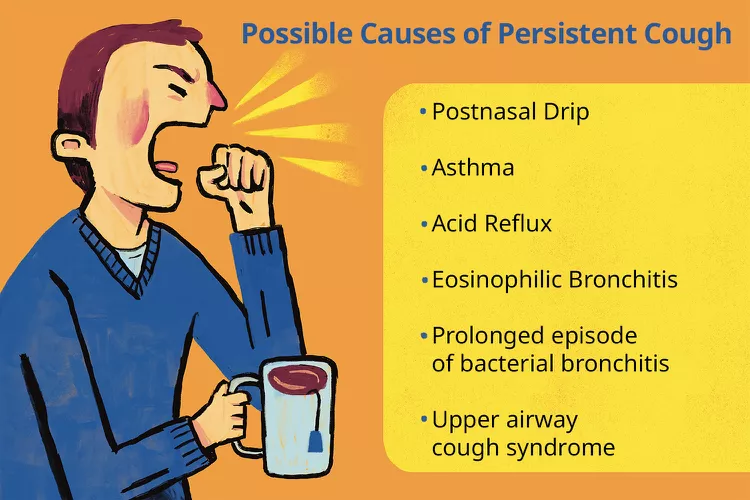Dr. Shilpa Gandhi | Leading Consultant Minimally Invasive Thoracic Surgeon In Nagpur
Meet Our Doctor
Dr. Shilpa Gandhi
MBBS, DNB General Surgery DNB Thoracic Surgery
Dr. Shilpa Gandhi is a trusted and experienced healthcare professional known for her compassionate care and expertise. Committed to delivering personalized treatments and improving patient well-being.


Persistent Cough Diagnosis In Nagpur
A persistent cough can be frustrating, exhausting, and even alarming when it doesn’t go away. It can disrupt your daily activities, interfere with sleep, and signal underlying health issues that require attention. Proper persistent cough diagnosis is the first step toward identifying the cause and finding effective treatment. Whether your cough is dry, wet, or accompanied by other symptoms, addressing it promptly can improve your quality of life and prevent complications.
A persistent cough is more than just an annoyance; it can be a symptom of an underlying health condition that requires professional attention. If you’ve been dealing with a cough that just won’t go away, understanding the importance of a persistent cough diagnosis is key to finding relief. A cough that lasts longer than three weeks or continues after other symptoms have subsided warrants a thorough evaluation to uncover the root cause.
What Is a Persistent Cough?
A persistent cough is one that lasts for a more than three weeks. It may begin as part of a common cold or respiratory infection but continue long after other symptoms subside. Coughs lasting more than eight weeks are considered chronic and often require a thorough evaluation to determine the cause.
Persistent coughs can be:
- Dry (non-productive): No mucus is produced, often linked to irritation or inflammation.
- Wet (productive): Mucus or phlegm is present, usually indicating infection or lung conditions.
Symptoms Associated with Persistent Cough
A persistent cough is often accompanied by additional symptoms that provide clues about its cause. These may include:
- Shortness of breath or wheezing.
- Chest tightness or pain.
- Sore throat or hoarseness.
- Post-nasal drip (a sensation of mucus dripping down the throat).
- Fatigue from prolonged coughing episodes.
- Fever, chills, or night sweats in cases of infection.
Common Causes of a Persistent Cough
A persistent cough can result from a variety of underlying issues. The most common causes include:
1. Respiratory Conditions
- Asthma: Coughing triggered by airway inflammation or exposure to allergens.
- Chronic Obstructive Pulmonary Disease (COPD): Chronic cough due to lung damage from smoking or environmental irritants.
- Bronchitis: Persistent inflammation of the bronchial tubes causing mucus production.
- Post-viral Cough: Lingering irritation of airways after a cold or flu.
2. Gastrointestinal Issues
- Acid Reflux (GERD): Stomach acid flowing back into the esophagus can irritate the throat and cause coughing.
3. Infections
- Tuberculosis (TB): A serious bacterial infection causing prolonged cough with mucus or blood.
- Whooping Cough (Pertussis): The bacterial infection characterized by severe coughing fits.
- Pneumonia: A lung infection that can result in a productive cough.
4. Environmental or Lifestyle Factors
- Smoking or exposure to secondhand smoke.
- Allergies to pollen, dust, or mold.
- Inhalation of irritants like chemicals or pollution.
5. Other Medical Conditions
- Heart Failure: Fluid buildup in the lungs can cause coughing and difficulty breathing.
- Lung Cancer: Persistent coughing, sometimes with blood, can be an early symptom.
The Importance of Persistent Cough Diagnosis
While many persistent coughs may result from minor conditions, they can sometimes signal serious health issues. Proper persistent cough diagnosis is essential to identify the root cause and rule out life-threatening conditions like lung cancer or tuberculosis. Early diagnosis allows for targeted treatment and prevents further complications.
How Is Persistent Cough Diagnosed?
A healthcare provider will use a comprehensive approach to determine the cause of your persistent cough. This process typically includes:
1. Medical History and Symptom Evaluation
- Reviewing your symptoms, their duration, and any triggers or patterns.
- Discussing your lifestyle, smoking history, or exposure to irritants.
2. Physical Examination
- Listening to your lungs and heart with a stethoscope to detect abnormal sounds.
- Checking for signs of infection, inflammation, or post-nasal drip.
3. Diagnostic Tests
- Chest X-ray or CT Scan: Visualize the lungs for infections, tumors, or structural abnormalities.
- Pulmonary Function Tests (PFTs): Assess lung capacity and airflow for asthma or COPD.
- Sputum Analysis: Examine mucus for signs of infection or inflammation.
- Endoscopy: Investigate acid reflux or gastrointestinal issues.
- Allergy Tests: Identify triggers that may be causing your cough.
Effective Treatments After Persistent Cough Diagnosis
Once the underlying cause of your persistent cough is identified, treatment can be tailored to provide relief and address the root problem. Common treatments include:
1. Medications
- Inhalers: Relieve asthma and COPD symptoms by opening airways.
- Antibiotics: Treat bacterial infections like pneumonia or tuberculosis.
- Acid Reducers: Help manage acid reflux-related coughs.
- Antihistamines or Decongestants: Alleviate post-nasal drip caused by allergies.
2. Lifestyle Changes
- Quit smoking and avoid exposure to irritants.
- Maintain proper hydration to thin mucus and soothe your throat.
- Use a humidifier to the keep airways moist, especially in dry environments.
3. Specialized Therapies
- Pulmonary Rehabilitation: For chronic lung diseases like COPD.
- Speech Therapy: In cases where vocal cord dysfunction contributes to coughing.
4. Surgical Intervention
- In rare cases, surgery may be necessary for structural abnormalities or removing tumors.
Preventing a Persistent Cough
Preventing a persistent cough often involves taking proactive measures to protect your respiratory and overall health:
- Get vaccinated for respiratory illnesses like flu or pneumonia.
- Avoid smoking and secondhand smoke.
- Wear masks in polluted environments or when exposed to allergens.
- Treat colds or infections promptly to prevent lingering symptoms.Contact Us
Conclusion
A persistent cough that lingers for weeks or even months is not something to ignore. It could be a sign of a serious underlying health issue, ranging from respiratory conditions like asthma or COPD to infections or even heart failure. An accurate persistent cough diagnosis is essential to identify the root cause and begin appropriate treatment. By addressing the issue early, you can prevent further complications or improve your quality of life.
Whether your cough is dry, productive, or associated with other symptoms, seeking professional evaluation ensures you receive the right care tailored to your condition. With advanced diagnostic tools and expert treatment options available, there’s no reason to suffer through a persistent cough.Book an appointment with Dr. Shilpa Gandhi for specialized thoracic care.



